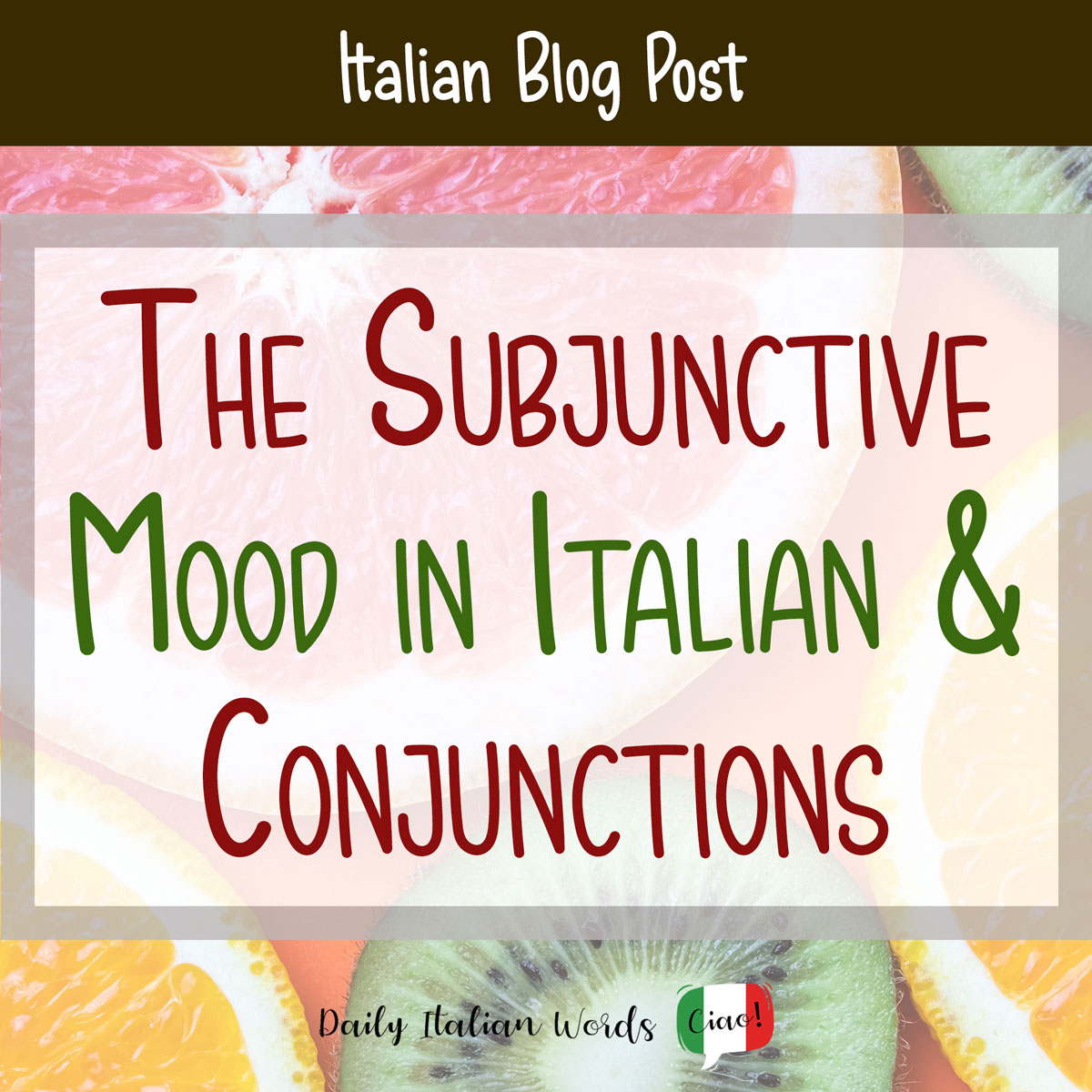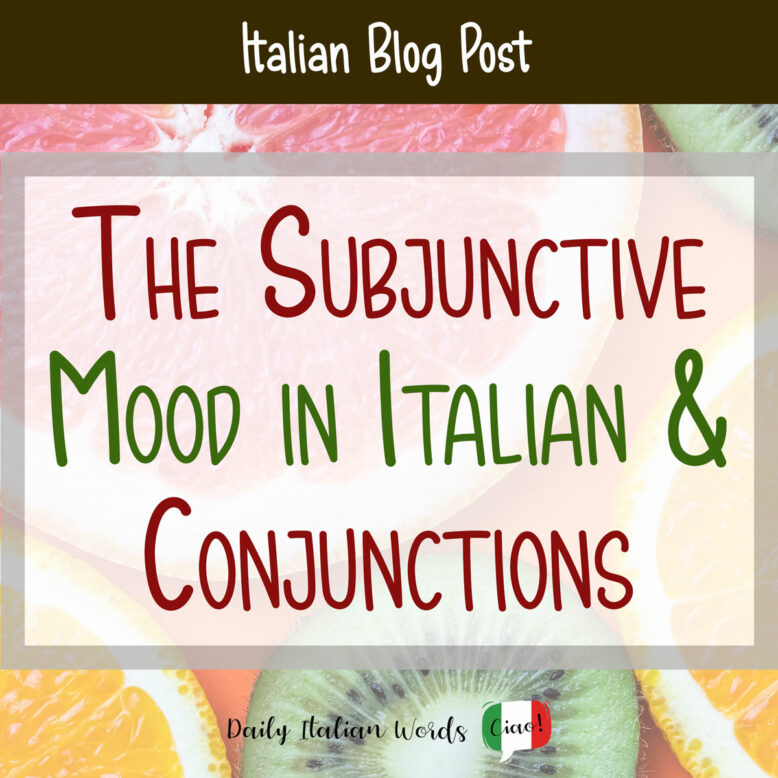
[ad_1]
Welcome to our third encounter with the subjunctive: if in case you have learn our earlier articles, it’s best to have a transparent concept of the right way to use this necessary verb temper; if in case you have not learn them but, you’ll find them right here and right here. As we speak we are going to conclude our journey by speaking concerning the subjunctive ‘in actual life’, and specifically about its use with conjunctions, however earlier than we go any additional, here’s a transient abstract of the important thing factors about this distinctive function of the Italian language:
- The subjunctive temper is used to specific risk, want, concern, doubt and private opinion. The indicative temper, in distinction, presents info as true, actual, sure. Credo che tu sia felice: subjunctive; So che tu sei felice: indicative.
- It’s usually utilized in dependent clauses launched by che: Io spero che tu vada presto a Roma. Be careful! If the topic of the 2 clauses is similar, use di + infinitive: Io penso di andare presto a Roma.
- It is usually utilized in impartial clauses to specific a doubt, a want, an exhortation, an exclamation. Viva l’Italia! Sapessi come sono felice!
- It has 4 tenses: presente, imperfetto, passato, trapassato.

Il congiuntivo ama le congiunzioni (The subjunctive loves conjunctions)
We all know that the phrases congiuntivo and congiunzione each come from the Latin coniungĕre, which suggests to affix, to unite; our focus right this moment is on conjunctions that require the subjunctive temper. Here’s a checklist of the commonest ones:
As all the time, there are exceptions: a couple of conjunctions might be adopted by the indicative or the subjunctive, relying on whether or not we’re expressing a sure reality or a risk. Allow us to put all this into apply to make the whole lot clearer: you might be having dinner at a buddy’s home in your favorite Italian metropolis; you might have introduced a present for the hostess, and simply as you might be about to provide it to her…
David: Carol, dov’è il regalo per Elena? Spero che tu non lo abbia dimenticato a casa. Ah, eccolo. Ma Carol, non hai tolto l’etichetta del prezzo!
Carol: Pensavo che l’avessi tolta tu! Presto, toglila, prima che Elena la veda!
David: Un attimo, devo farlo con calma, senza che si rompa. Fatto!
Carol: Appena in tempo! Eccola…
David: Carol, the place is Elena’s current? I hope you didn’t overlook it at residence. Ah, right here it’s. However Carol, you didn’t take the worth tag off!
Carol: I believed you took it off! Fast, take it off earlier than Elena sees it!
David: Wait a second, I’ve to do that slowly, with out breaking it. Performed!
Carol: Simply in time, right here she is…
Senza che, prima che
On this dialogue, the subjunctive is within the sentences spero che tu non lo abbia dimenticato and pensavo che l’avessi tolta, launched by the verbs sperare and pensare. David hopes and Carol thought, we’re removed from the world of certainty and the subjunctive right here is obligatory. Within the following sentences, the subjunctive is launched by the conjunctions prima che, actually “earlier than that”, and senza che, actually “with out that”: earlier than Elena sees it and with out breaking it. Prima che seems to the longer term, we’re speaking about an motion that’s not actual but, and the identical goes for senza che: we’re nonetheless within the realm of risk. As you possibly can see, the subjunctive is alive and effectively in our ideas and in on a regular basis speech.
Allow us to now take a look at different frequent conjunctions.
Affinché, perché
Affinché, perché, in modo che, cosicché (in order that, with a purpose to): all these conjunctions specific the aim of an motion, and they’re adopted by the subjunctive.
- Spiegherò la regola cosicché possiate capire. = I’ll clarify the rule so to perceive.
- Spiego la grammatica in inglese in modo che la capiate tutti. = I clarify grammar in English so that you simply all perceive it.
However what about perché? Doesn’t it imply why/as a result of? Not all the time. Perché may also be a synonym of affinché:
- Ho comprato due biglietti per il cinema perché venga anche tu.
I purchased two cinema tickets so to come, too; possibly you’ll come, possibly you’ll not, this can be a risk.
- Ho comprato due biglietti per il cinema perché vieni anche tu.
The that means right here is totally different: I purchased two cinema tickets since you are coming too. You might be coming: this can be a reality, vieni, indicative.
No worries! You do not need to consider whether or not a reality is definite or not each time you select a conjunction; there are solely few exceptions and the context all the time clarifies the that means of perché:
- Cucino perché amo mangiare. = I cook dinner as a result of as a result of I like consuming.
- Vado a casa a cucinare perché Elena trovi la cena pronta. = I’m going residence to cook dinner in order that Elena finds dinner prepared.

Benché, nonostante, malgrado
Benché, nonostante, malgrado: though, regardless of. Some examples:
- Nonostante abbia studiato, non ho capito la regola. = Though I studied, I didn’t perceive the rule.
- Per quanto studi, non passo gli esami. = Regardless of how a lot I examine, I don’t move my exams.
- Benché io ami il mare, vado sempre in montagna. = Though I like the ocean, I all the time go to the mountains.
- Vado a ballare malgrado sia stanca = I’m going dancing though I’m drained.
Be careful: the conjunction anche se, even when, is adopted by the indicative:
- Vado a ballare anche se sono stanca. = I’m going dancing though I’m drained.
Come se, quasi
Come se means as if, whereas quasi means nearly/nearly like.
- Sono felice come se fossi in vacanza. = I’m as blissful as if I had been on vacation.
- Questa plastica è molto trasparente, quasi fosse vetro. = This plastic could be very clear, nearly like glass.
Quasi and come se require the imperfect subjunctive, a tense that’s usually used for imagined conditions: I’m not on vacation and this plastic shouldn’t be glass. Right here Italian is much like English, the place a previous tense can also be used for imagined conditions: If I gained the lottery, I’d purchase a Ferrari. = Se vincessi la lotteria, comprerei una Ferrari.
A condizione che, a patto che
A big group of conjunctions are utilized in conditional sentences, equivalent to a condizione che, a patto che, purché, nel caso che, se, qualora, nell’eventualità che, casomai, ammesso che…
Just a few examples:
- Nell’eventualità che i biglietti siano finiti, guarderò il concerto alla TV. = Within the occasion that tickets are offered out, I’ll watch the live performance on TV.
- Ti ascolto, a patto che tu mi dica la verità. = I’ll pay attention, so long as you inform me the reality.
- Se fosse vero, te lo direi. = If it had been true, I’d inform you.
Allow us to wrap up our overview of Italian conjunctions that require the subjunctive with an excerpt from a track by Lucio Dalla, probably the most standard Italian singer-songwriters of all time:
Così lei restò sola nella stanza, la stanza sul porto, con l’unico vestito ogni giorno più corto, e benché non sapesse il nome e neppure il paese, m’aspettò come un dono d’amore, fin dal primo mese.
Can you notice the subjunctive? I wager you possibly can!
Our movies on the subjunctive temper:
Concerning the Creator: My Italian Circle is a spot the place you possibly can go to seek out participating new methods to study Italian, take a look at and enhance your listening expertise, and possibly even make peace with Italian grammar. We create clear, correct, genuine content material each week on YouTube and Patreon.
[ad_2]